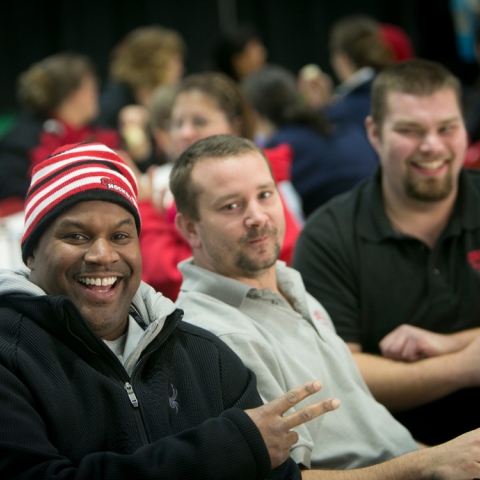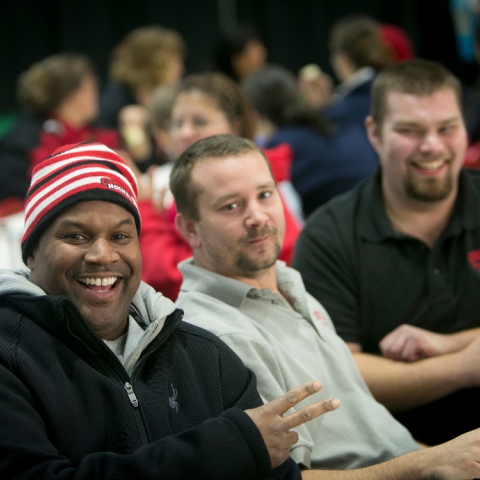
Pawprint | January 26, 2017
 Who is most likely to notice if someone is struggling with opening a door or having difficulties finding a bathroom – or likely to overhear a racially based or sexually charged joke or anecdote? Who is key to setting an underlying climate of diversity and inclusion on campus?
Who is most likely to notice if someone is struggling with opening a door or having difficulties finding a bathroom – or likely to overhear a racially based or sexually charged joke or anecdote? Who is key to setting an underlying climate of diversity and inclusion on campus?
At the fifth annual Employee Workshop for Building Care Custodial Staff, held Jan. 12 in the Statler Auditorium, a number of the speakers noted that custodial staff are often witnesses to actions, words and conditions that would otherwise go unnoticed.
“You are the folks who know what is happening in your building,” said Andrea Haenlin-Mott, addressing the more than 400 custodial staff attending the workshop. “You notice if snow removal is needed, if ramps are slippery, if objects protrude into passageways, or if lifts or elevators aren’t working properly.”
Haenlin-Mott also described the all-gender, single access restrooms signage initiative that her office completed last year, not just to meet the needs of those who identify as transgender, but also for those whose disability or age requires the assistance of a family member who might be of another gender.
Angela Winfield, director of the Department of Inclusion and Workforce Diversity and the university diversity officer for staff, explained how Cornell goes beyond the compliance of the Equal Employment and Educational Opportunity act through its “any person … any study” mission that is the basis of the Open Doors, Open Hearts, Open Minds statement. She also provided an overview of Cornell’s diversity and inclusion framework, Toward New Destinations, reviewing its four core principles: composition, or the demographics of the Cornell community; engagement, or how committed employees are to their work; inclusion, or how employees feel about their place in the workplace; and achievement, or how employees are growing or developing.
“The secret ingredient” to a diverse and inclusive campus, she said, “is you.” Staff need to make sure they are getting the tools they need to work, and they set an underlying tone for the climate for inclusion and diversity on campus.
Human resource professionals for Infrastructure Properties and Planning Donna-Marie Parker, Bob Wakeman and Becky Hill discussed how staff need to be aware of their surroundings and those around them. While staff should show consideration for others, they need to be aware of how their actions might be perceived. Is it appropriate to be friends with students on Facebook or to accept an invitation to a student party? Both activities can place staff members in vulnerable situations, they cautioned.
Ulysses Smith, lead diversity and inclusion strategist for the Department of Inclusion and Workforce Diversity, led a scenario-based discussion on some of the “hot topics” that his office has dealt with recently concerning social media, sexual harassment, race and gender inclusion. He showed how to have healthy conversations about these situations and closed with advice on what it means to be someone’s ally, especially in a workplace setting.
“The spark for many of the agenda items came from the campus dialog on universal access restrooms and our work last year to support the university initiatives,” said Ben Kuo, associate vice president for facilities management. “As we think about truth, respect, excellence, teamwork and integrity, the concepts of diversity and inclusion embody these values in the deepest possible way…. Our roles in maintaining our campus are critical to creating an environment that is inclusive.” He hoped that the custodial staff would use the dialogues they had during the workshop “to interact, question and grow in your understanding, and to build upon the great work that you do every day.”
This article originally appeared in the Cornell Pawprint Newsletter for staff on January 26th, 2017. The original link is no longer available.
Learn more about Cornell's diversity & inclusion on our Human Wellbeing page.
